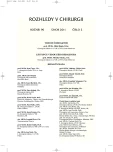Immunosuppression Following Venous Allografts Transplantations – The Authors’ experience
Authors:
M. Adamec; I. Matia; L. Janoušek
Authors‘ workplace:
KTCH IKEM Praha, přednosta: prof. MUDr. Miloš Adamec, CSc.
Published in:
Rozhl. Chir., 2011, roč. 90, č. 2, s. 130-133.
Category:
Monothematic special - Original
Overview
Aim:
Venous and arterial graft usage in vascular reconstructions was re-discovered in connection with organ transplantation development. Allografts are employed in many clinics, however, uniform opinion on the use of immunosuppression after the procedure of venous graft transfer from a cadaveric donor, is still lacking.
Material and Methods:
The authors present their own group of patients who underwent vascular reconstructions, and in whom allogenic vein was used. The majority of indications for bypass procedures resulted from critical limb ischemia. Immunosuppressive medication was administered during the vascular procedure and, over the past several years, it purely consisted of tacrolimus monotherapy.
Results:
In the group of 101 patients, no serious complications due to adverse effects of immunosuppresion therapy were recorded.
Key words:
immunosuppression – venous allograft – transplantation – critical limb ischemia
Sources
1. Hejnal, J., Krajíček, M., Zástava, V. Cévní náhrady. Academia, 1967.
2. Lopez-Cepero, M., Sanders, C. E., Buggs, J., et al. Sensitization of renal transplant candidates by cryopreserved cadaveric venous or arterial allografts. Transplantation, 2002; 73 : 817–819.
3. Prager, M., Holzenbein, T., Aslim, E., et al. Fresh arterial homograft transplantation: A novel concept for critical limb ischaemia. Eur. J. Vasc. Endovasc. Surg., 2002; 24 : 314–321.
4. Madden, R., Lipkowitz, G., Benedetto, B., et al. Decellularized cadaver vein allografts used for hemodialysis access do not cause allosensitization or preclude kidney transplantation. Am. J. Kidney Dis., 2002; 40 : 1240–1243.
5. Bandlien, K. O., Toledo-Pereyra, L. H., MacKenzie, G. H., et al. Immunosuppression with cyclosporine. A new approach to improve patency of venous allografts. Arch. Surg., 1983; 118 : 829–833.
6. Zoja, C., Furci, L., Ghilardi, F., et al. Cyclosporin-induced endothelial cell injury. Lab. Invest., 1986; 55 : 455–462.
7. Khanna, A., Kapur, S., Sharma, V., et al. In vivo hyperexpression of transforming growth factor-beta1 in mice: Stimulation by cyclosporine. Transplantation, 1997; 63 : 1037–1039.
8. Azuma, N., Sasajima, T., Kubo, Y. Immunosuppression with fk506 in rat arterial allografts: Fate of allogeneic endothelial cells. J. Vasc. Surg., 1999; 29 : 694–702.
9. Matia, I., Varga, M., Lodererova, A., et al. The positive effect of immunosuppression on adaptation of venous allografts to arterialisation in rats. Eur. J. Vasc. Endovasc. Surg., 39 : 478–484.
10. Matia, I., Lodererova, A., Adamec, M. Delayed administration of fk506 is sufficient to suppress acute rejection changes after aortal transplantation in rats. Transpl. Int., 2007; 20 : 371–380.
Labels
Surgery Orthopaedics Trauma surgeryArticle was published in
Perspectives in Surgery

2011 Issue 2
- Possibilities of Using Metamizole in the Treatment of Acute Primary Headaches
- Metamizole vs. Tramadol in Postoperative Analgesia
- Spasmolytic Effect of Metamizole
- Metamizole at a Glance and in Practice – Effective Non-Opioid Analgesic for All Ages
-
All articles in this issue
- Simultaneous Transplantation of the Kidney and the Islets of Langerhans
- Liver Transplantation in Patients with Portal Vein Thrombosis
- Early Biliary Complications Following Liver Transplantation
- First Czech and Slovak Domino Liver Transplantation
- Development of Pancreas Transplantation Surgical Techniques in IKEM
- Immunosuppression Following Venous Allografts Transplantations – The Authors’ experience
- Effect of Biological Glues on Vascular Wall in an Experimental Model of Aortic Dissection
- Technique of Implantation and Experience with Temporary Mechanical Cardiac Support in Right Ventricular Failure
- Outcomes of Combined Mitral Valve Repair Surgery and Aortic Valve Replacement in IKEM Praha
- Cardiosurgical Procedures in Patients Refusing Blood Transfusions: IKEM Outcomes
- Vascular Complications in Transcatheter Aortic Valve Implantation in IKEM
- Perspectives in Surgery
- Journal archive
- Current issue
- About the journal
Most read in this issue
- Early Biliary Complications Following Liver Transplantation
- Cardiosurgical Procedures in Patients Refusing Blood Transfusions: IKEM Outcomes
- Outcomes of Combined Mitral Valve Repair Surgery and Aortic Valve Replacement in IKEM Praha
- Development of Pancreas Transplantation Surgical Techniques in IKEM
